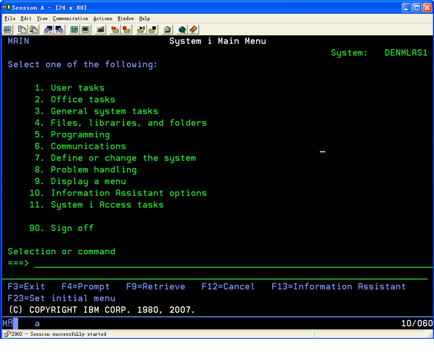SQL functions are built into Oracle Database and are available for use in various appropriate SQL statements. If you call a SQL function with an argument of a datatype other than the datatype expected by the SQL function , then Oracle attempts to convert the argument to. In Oracle , you can create your own functions. Use the CREATE FUNCTION statement to create a standalone stored function or a call specification. Stored functions are very similar to procedures, except that a function returns a value to the environment in which it is called.
A function is a subprogram that is used to return a single value. You must declare and define a function before invoking it. It can be declared and defined at a same time or can be declared first and defined later in the same block. There are no servers to provision and manage.
The platform autoscales functions. You only pay for functions when they are execute and nothing for idle time. This is a great model, especially for event driven. Date and Time Functions This section describes the functions that can be used to manipulate temporal values. Date and Time Types” , for a description of the range of values each date and time type has and the valid formats in which values may be specified.
It qualifies aggregate_ function , indicating that only the FIRST or LAST values of aggregate_ function will be returned. DENSE_RANK FIRST or DENSE_RANK LAST indicates that Oracle Database will aggregate over only those rows with the minimum (FIRST) or the maximum (LAST) dense rank (also called olympic rank). This tutorial provides you all Oracle string functions with examples that help you manipulate character strings more effectively.
Oracle Reference: Oracle Functions: PSOUG ForuOracle Blogs Search the Reference Library pages: Free Oracle Magazine Subscriptions and Oracle White Papers: Oracle Functions: Version 11. General: Note: This page does not include Pipelined Table Functions. They are linke along with related topics at bottom of the page. Single-row functions return a single result row for every row of a queried table or view.
These functions can appear in select lists, WHERE clauses, START WITH and. The function leverages the Object Storage APIs in the Oracle Cloud Infrastructure Java SDK to access the Object Storage bucket. Oracle is a relational database technology developed by Oracle. PLSQL stands for Procedural Language extensions to SQL, and is an extension of SQL that is used in Oracle. PLSQL is closely integrated into the SQL language, yet it adds programming constructs that are not native to SQL.
Our tutorial will start with the basics of Oracle such as how to retrieve and manipulate data. This book includes scripts and tools to hypercharge Oracle 11g performance and you can buy it for off directly from the publisher. Use Oracle Functions (sometimes abbreviated to just Functions) when you want to focus on writing code to meet business needs. Single Row Functions: Single row or Scalar functions return a value for every row that is processed in a query.
Summary: in this tutorial, you will learn how to use the Oracle function -based index to speed up queries that consist of functions. Introduction to Oracle function -based index. We will use the members table created in the CREATE INDEX tutorial for the demonstration. Oracle has many built-in functions and Oracle also allows you to define your own function and make it a part of your own SQL dialect. Oracle SQL Functions list Oracle Tips by Burleson Consulting.
You can see all built-in Oracle functions with this query: select distinct object_name. The Oracle DECODE function can be confusing to those who have never used it. It’s a useful function for comparing values.
Learn more about this function and some examples in this video. Purpose of the Oracle DECODE Function. The purpose of the Oracle DECODE function is to perform an IF-THEN-ELSE function. Traditionally, performing a function on an indexed column in the where clause of a query guaranteed an index would not be used.
Oracle 8i introduced Function -Based Indexes to counter this problem. Rather than indexing a column, you index the function on that column, storing the product of the function , not the original column data. Oracle: return a table from a function. With collections and the table() function, a function can return a table that can be queried in an SQL statement.

First, we need to create a record type. In this article, I’ll explain how to use it, and show you some examples. The MIN function returns the minimum value of the expression you provide it.
I want to get a list of all the functions and procedures used in each database. Is this possible via a query?
Brak komentarzy:
Prześlij komentarz
Uwaga: tylko uczestnik tego bloga może przesyłać komentarze.